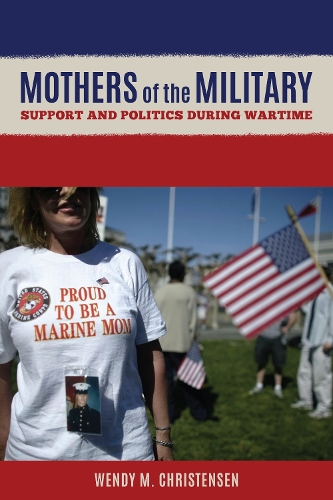
Mothers of the Military: Support and Politics during Wartime
(Hardback)
Publishing Details
Mothers of the Military: Support and Politics during Wartime
By (Author) Wendy M. Christensen
Bloomsbury Publishing PLC
Rowman & Littlefield Publishers
9th August 2018
United States
Classifications
General
Non Fiction
Gender studies: women and girls
Public opinion and polls
Other warfare and defence issues
Military forces and sectors
355.120973
Physical Properties
Hardback
224
Width 157mm, Height 237mm, Spine 23mm
472g
Description
Mothers of the Military examines the distinctive kinds of support required during an increasingly privatized war, specifically material, moral and healthcare support. Mothers are a particularly key part of the current support system for service members, and Wendy Christensen follows the mothers of U.S. service members in the War on Terrorism through the stages of recruitment, deployment, and post-deployment. Bringing to light the experiences and stories of women who are largely invisible during warthe mothers of service members. Over 2.5 million members of the U.S. military have deployed to Iraq or Afghanistan during the now 16 year-long war. Each service member has loved onesspouses, parents and childrenwho provide necessary emotional and physical support during deployment. This book has three goals. The first is to make mothers experiences during wartime visible. The second is to interrogate what support means during war. Finally, it examines the impact of war support on mothers political participation. Ideally, civilians provide moral approval of war, patriotism, and extend understanding and appreciation of the sacrifice enlistees and their families are making. But, in these long wars, public and political approval has plummeted. It is not surprising this narrow slice of Americans dealing with the daily realities of war feels increasingly separate from civilians. Military families are isolated from those Americans who are able to ignore the war or offer superficial expressions of patriotic gratitude. Mothers occupy a complex gendered location during wartime. Even though women are now serving in combat positions, women have historically held down the home front, where family labor is still assigned disproportionately to women. However, the military does not treat mothers and fathers equally. The military assumes fathers will be supportive of service, and calls on them to be proud of the courageous decision their child has made. They consider mothers, on the other hand, potential impediments to service, not wanting their child in harms way. Through each stage of service, mothers take on different kinds of support for their child, for the military, and for war policy. At each stage of war, mothers are prescribed a gendered support position. In recruitment material, the military assumes mothers will be emotional and worried about enlistment, so they appeal to mothers love and need for their child to be safe. During deployment, mothers provide supplies and moral support. Declining enlistment numbers and a long war have led to multiple deployments and unprecedented burdens on military families. These mothers step in to help with childcare and finances. Furthermore, mothers are overwhelmingly, according to military studies, the ones providing mental and physical healthcare when veterans need it. As providers of critical systems of war support, mothers bear much of the burden of the current wars. War provides mothers a way to participate in the national project, but the uneven burden of being a constant supporter further marginalizes their citizenship. The gendered support role the military designs for mothers is not designed to facilitate active democratic citizenship but rather to make it seem natural that they, too, fall in line with the chain of command. Mothers of the Military, as a whole, asks how the acts of supplying material, moral, and medical support end up so often marginalizing mothers as citizens from the political process and under what conditions do mothers resist
Reviews
Christensens research is based on Department of Defense recruitment and support documents, interviews with mothers, and military mothers message boards. Her conclusive chapter focuses on 10 points that political and governmental leaders would do well to consider. * Booklist *
Wendy Christensen doesnt let us slide into simplistic assumptions about either militarization or women as mothers. Her careful listening over a decade reveals American racially diverse women dealing with their governments pressures, their own expectations, their strategic choices about when to stay silent and when to speak out. This book has taught me a lot. -- Cynthia Enloe, Clark University; author of The Big Push: Exposing and Challenging Persistent Patriarchy
Too often the experience of parents is left out of research about military families, despite military members financial, psychological, and other reliance on parents, especially mothers, during enlistment, deployment, and their return, especially if injured physically or psychologically. Through an analysis of online message boards, military documents, and email interviews Wendy Christensen examines the gendered civic engagement of military mothers. Norms related to gender and patriotism encourage mothers to identify with and fiercely support the U.S. military, as well as the wars their children are ordered to fight. The rich ethnography deftly portrays the emotions of the homefront and the unpaid labor required to support troops. Mothers of the Military: Support and Politics during Wartime demonstrates how carework is translated into supplying the next generation of soldiers, coopted as support for military missions, and can also compel critiques of the Department of Veterans Affairs. -- Lisa Leitz, chair of Peace Studies, associate professor of Sociology at Chapman University; author of Fighting for Peace: Veterans and Military Families in the Anti-Iraq War Movement
Author Bio
Wendy M. Christensen, PhD, is an Associate Professor in the Department of Sociology at William Paterson University in Wayne, New Jersey. She has published in journals such as Ethnic and Racial Studies, Critical Military Studies, and the International Journal of Feminist Politics. Her current research interests focus on how race, class, and gender inequalities shape political participation and grassroots political organization.
